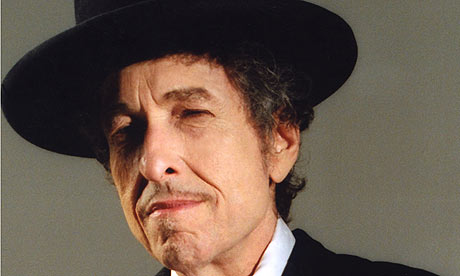Bob Dylan and how to integrate jewish humor within a Western and heavily Christianized context.It takes a certain genius and chutzpah to place himself as a Hasid, somehow lost, but at home in what could be wild party in Odessa straight out of the Isaac Babel canon. Dylan just defies the ordinary and here again, uses humor as a redemptive quality as part of a response to modernity. Dylan is Heine, Roth, Singer, and Babel rolled into 12 bars. At the same time, as artist, there is a certain attention drawn to what once was, in the not distant past, the precarious societies that brought Jewish humor into being and the certain price it yanked out from both the audience and the artist.

— But ever since the abrupt move back to a simpler method of musical presentation with John Wesley Harding in 1968, Dylan’s erratic progress has invited his listeners to poke away behind the surfaces of his apparently enigmatic behaviour. —Read More:http://www.guardian.co.uk/music/2009/dec/11/bob-dylan-christmas-in-the-heart
The Russia, or pale of settlement of yore was a bottomless pit anti-Semitic thought, where the pogrom was like a chronic disease that arose when both least and most expected to quell populist fervor. The outsider cultural vision of the Jew in that era was nothing short of demonic: dishonest, parasitic, feeble foreign stain within society, a scapegoat or generic character ready-made for ridicule. It was Isaac Babel that broke the norm with his Odessa Tales, of completely out-of-the-box figures, intense in both flaws and virtues all underlined by an honest vivid portrayal that discarded perpetuated stereotypes and arrived at Bob Dylan types of complexities and transcendent enigmas that slowly reveal themselves…
Historically, including Chekov and Dostoevsky, the Jewish archetype of limited to the fool, usually tragic, the thief or robber, and the opportunist usually all with sexual quirks, dysfunctions and pre-packaged for some blood libel if the neeed arose. With Babel, these characterization were seen to be what they were: illusion and kitschy crap to make the insecure bourgeois feel better about themselves and that rather fragile constituency known as the “Russian soul.”





 COMMENTS
COMMENTS